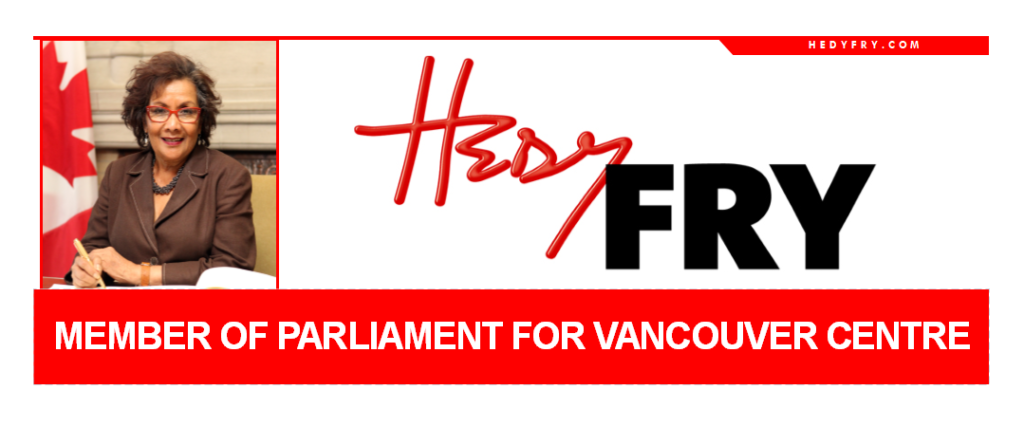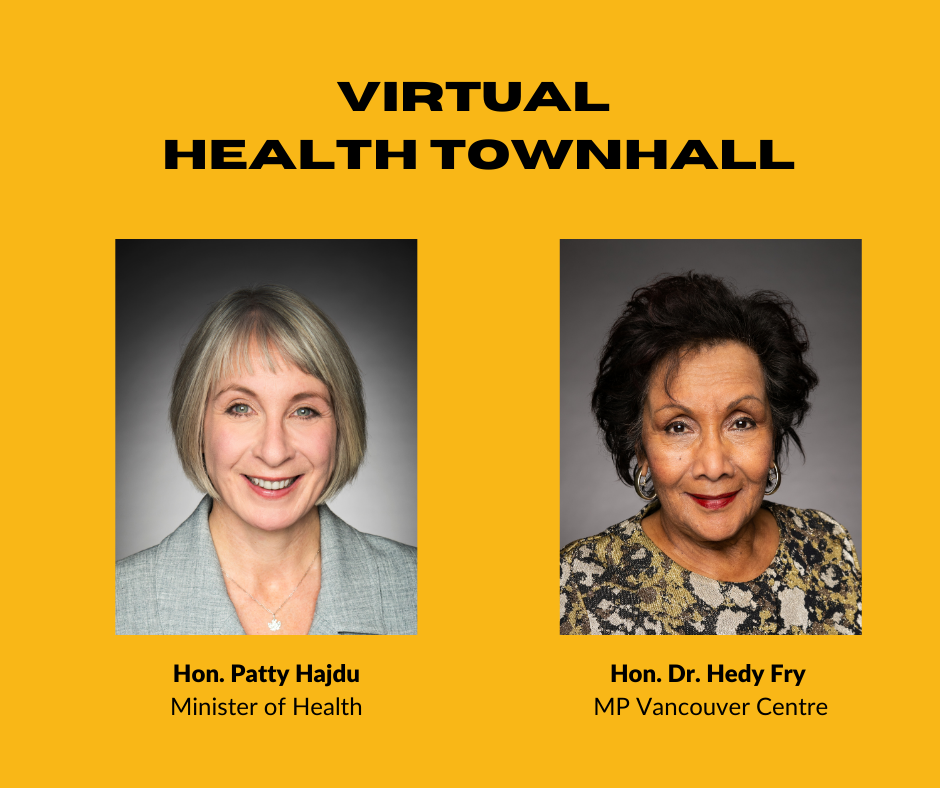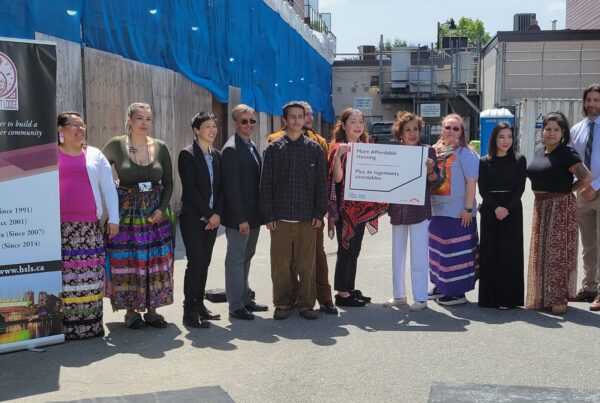
On December 2, 2020, I hosted Minister of Health Patty Hajdu.
Thank you Minister Hajdu for a frank and informative discussion at our Vancouver Centre Virtual Townhall last night. Your answers to constituents’ questions on vaccines, COVID-19, mental health & overdose deaths were concise and empathetic.
Minister Hajdu Opening Remarks:
- People are doing their best and making incredibly hard decisions during this terrible time.
- We need to be kind to each other to get through this. Nobody is trying to infect people on purpose.
Question 1: Mental Health
- While the impact of COVID-19 on older adults in residential care is an incredibly important issue, equally important is the impact that this pandemic has had on the mental health of older adults attempting to stay safe at home. What steps are you taking, and will you take to address this parallel crisis of older adult mental health?
- What supports can the federal government improve on (or implement) to support mental health for youth during the pandemic?
Minister Hajdu:
- Everyone is suffering on all sides of the age spectrum. We knew early on this was going to have an impact on people. That is why we put together Wellness Together, an online portal to give people access to mental health resources. You can visit it at Wellnesstogether.ca
- You can connect with professionals for counselling to help you.
- We have supported provinces by funding support health numbers such as Kids Help Phones.
Question 2: Vaccine Distribution
- When vaccines are available, how should we expect distribution to be allocated? Furthermore, will there be a passport or other system to denote who has already been vaccinated?
- Since Health is largely handled by the provinces, what have been some of your biggest challenges when coordinating with all your provincial counterparts during the Covid-19 pandemic?
- What are your plans for introducing the COVID-19 vaccine to Canadians? Also, how can the federal government play a more active role in funding scientific research focused on physical and mental health commodities and COVID-19?
- How will the vaccine be distributed after essential services, seniors in care facilities what about those persons with disabilities and seniors living in subsidized housing needing assistance
Minister Hajdu:
- Vaccines do not mean that COVID-19 will disappear. Diseases like COVID-19 are hard to kill. It is endemic and there is a high degree of circulation in society.
- Vaccines are an important part in reducing the amount of spread and saving lives.
- We have changed the way things are done in terms of approving a vaccine. Health Canada started reviewing the information from vaccine manufacturers as they were getting it instead of waiting for these manufacturers to have all their information. This process allows for faster approvals.
- We will never compromise the safety of Canadians. The Conservatives say that the Prime Minister should approve a certain vaccine or authorize a type of test. Unlike the Conservatives, we don’t believe that politicians should be making these decisions, scientists and health experts should be the ones making them.
- For the first couple months we will not have a lot of vaccines, so we need to prioritize. Afterwards as manufacturing increases and other vaccines are approved, we will have enough vaccines available for every Canadian. At the official’s levels, things are going smoothly, and the provinces are planning and practicing for all the different scenarios for vaccine distribution.
- There are a lot of unknowns on the immunity piece, so we are hesitant to put in place an immunity passport.
Question 3: Psilocybin
- Psilocybin Mushrooms have been shown to help patients who suffer from addiction and mental health. Why are we only allowing palliative Canadians access to mushrooms? Why don’t addicts or those with suicidal ideations deserve access?
Minister Hajdu:
- Through subsection 56, the Minister of Health approved an exemption and allowed someone who was not at the end of life to access these mushrooms.
- Yesterday (December 1st, 2020) Health Canada approved some physicians access to Psilocybin mushrooms to test. We are still testing these mushrooms and their effects; and we are taking these discussions out of the shadows and into more of a mainstream conversation.
Question 4: Why hasn’t BC signed on to the federal COVID-19 app?
Minister Hajdu:
- We are waiting for BC to sign on, and the more of us that sign up for this app the stronger the tool becomes.
- Some people are really stigmatized by getting COVID-19. The COVID Alert app provides complete anonymity for the user and the person that has been diagnosed, making it easier to access.
- We updated the app to let people know if they were contacted by someone who was developing COVID-19 symptoms since they can be contagious.
- There is nothing stopping BC residents from downloading the app. It will still work in certain circumstances.
- The COVID Alert app continues to work when the health system is overwhelmed and cannot continue to do contact tracing.
Question 5: How is the government of Canada working with the travel industry and airports to deploy testing and open travel? How has the pilot program in Alberta gone?
Minister Hajdu:
- The tourism sector was the first hit and the hardest hit. The tourism industry is suffering. We have been supporting them financially with all the economic measures we have put in place. The challenge is sometimes those economic supports aren’t enough.
- We are trying now to understand better how we reduce the 14-day quarantine and limit the importation of COVID-19. We have a few testing pilots in Alberta, Vancouver (not government run) and Toronto. These 3 research studies, particularly the one in Alberta that the Government of Canada is actively involved in, will give us a better understanding of the blend of testing and quarantine that could be applied to keep those numbers of importation low.
Question 6: Do you think if citizens were told where in specific locations that COVID-19 is experiencing higher spikes (grocery stores, parks, etc.) would that encourage people to adopt more social distancing and mask wearing?
Minister Hajdu:
- If we point to specific locations people might develop a false sense of security. You must assume you have the virus and be careful. We need to embrace this idea of keeping our social circles small.
Question 7: Since Health is largely handled by the provinces, what have been some of your biggest challenges when coordinating with all your provincial counterparts during the Covid-19 pandemic?
Minister Hajdu:
- It is the responsibility of provinces and territories deliver healthcare responsibilities. The Federal Government can help by providing funds, advice, guidance and equipment.
- We have been coordinating with the provinces. An aspect of good coordination: Dr. Theresa Tam works closely with all the medical officers of health across the country and they have what is called the Special Advisory Committee, which is how that guidance gets created.
Question 8: Will you support giving all Canadians Universal Access to free contraception?
Minister Hajdu:
- Our government supports women’s rights and reproductive choice. It is the foundation of feminism and gender equality.
- Where we can make some headway is in our work through the Pharmacare program. The work we are doing in Pharmacare is important and will make contraception very affordable or even free.
Question 9: More people have died from opioids than from COVID-19 in BC. What are you doing about it?
Minister Hajdu:
- We were seeing opioid deaths go down before the pandemic. We have done more than I thought was humanly possible (safe supply programs in Vancouver and safe consumptions sites).
- The City of Vancouver is looking at decriminalizing small amounts of substances. I have been working really close with Mayor Stewart and recently talked to the new Minister of Mental Health and Addictions. We have got requests in and we are working through these requests with the province and city. We should be there to provide the resources that the city needs, what that might look like and how it could be implemented.
- Decriminalization is not a silver bullet. We need to reach the middle class, individuals who won’t go to safe consumption sites and who overdose. We need to reach them at home.
- Substance use is a health problem not a criminal problem.
Question 10: Given recent US CDC data suggesting a high rate of severe COVID disease in pregnant women, including need for ICU care, intubation and mechanical circulatory support, will we be prioritizing vaccination in this demographic. What steps will Canada take to ensure the vaccine is both safe and effective in pregnant women?
Minister Hajdu:
- Unless it is indicated by the producers as safe, we will not distribute vaccines to pregnant women.
Thank you for joining my Virtual Townhall.






